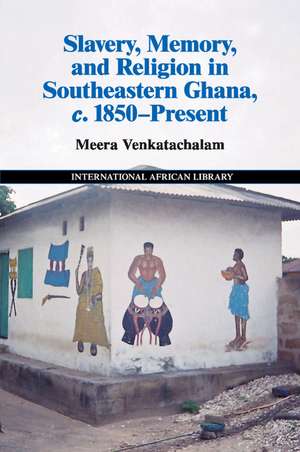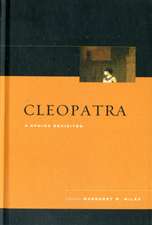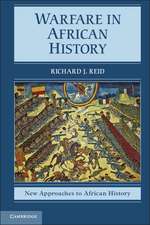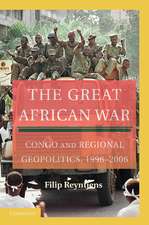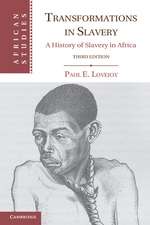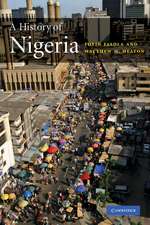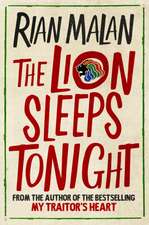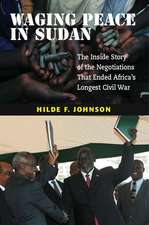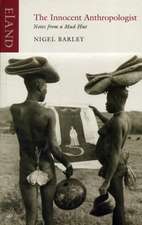Slavery, Memory and Religion in Southeastern Ghana, c.1850–Present: The International African Library, cartea 49
Autor Meera Venkatachalamen Limba Engleză Paperback – 20 dec 2017
| Toate formatele și edițiile | Preț | Express |
|---|---|---|
| Paperback (1) | 285.54 lei 6-8 săpt. | |
| Cambridge University Press – 20 dec 2017 | 285.54 lei 6-8 săpt. | |
| Hardback (1) | 689.93 lei 6-8 săpt. | |
| Cambridge University Press – 9 aug 2015 | 689.93 lei 6-8 săpt. |
Din seria The International African Library
-
 Preț: 230.54 lei
Preț: 230.54 lei -
 Preț: 230.79 lei
Preț: 230.79 lei -
 Preț: 229.90 lei
Preț: 229.90 lei - 9%
 Preț: 592.44 lei
Preț: 592.44 lei -
 Preț: 282.48 lei
Preț: 282.48 lei -
 Preț: 264.64 lei
Preț: 264.64 lei -
 Preț: 202.36 lei
Preț: 202.36 lei - 11%
 Preț: 583.36 lei
Preț: 583.36 lei - 14%
 Preț: 891.04 lei
Preț: 891.04 lei - 11%
 Preț: 636.34 lei
Preț: 636.34 lei -
 Preț: 226.17 lei
Preț: 226.17 lei -
 Preț: 285.37 lei
Preț: 285.37 lei -
 Preț: 323.27 lei
Preț: 323.27 lei -
 Preț: 289.01 lei
Preț: 289.01 lei -
 Preț: 326.15 lei
Preț: 326.15 lei -
 Preț: 287.66 lei
Preț: 287.66 lei -
 Preț: 288.25 lei
Preț: 288.25 lei -
 Preț: 285.54 lei
Preț: 285.54 lei -
 Preț: 306.47 lei
Preț: 306.47 lei -
 Preț: 285.75 lei
Preț: 285.75 lei -
 Preț: 284.17 lei
Preț: 284.17 lei -
 Preț: 285.37 lei
Preț: 285.37 lei -
 Preț: 283.03 lei
Preț: 283.03 lei -
 Preț: 279.76 lei
Preț: 279.76 lei -
 Preț: 281.30 lei
Preț: 281.30 lei -
 Preț: 282.48 lei
Preț: 282.48 lei -
 Preț: 213.63 lei
Preț: 213.63 lei - 11%
 Preț: 585.59 lei
Preț: 585.59 lei
Preț: 285.54 lei
Nou
Puncte Express: 428
Preț estimativ în valută:
54.64€ • 57.19$ • 45.48£
54.64€ • 57.19$ • 45.48£
Carte tipărită la comandă
Livrare economică 31 martie-14 aprilie
Preluare comenzi: 021 569.72.76
Specificații
ISBN-13: 9781107519169
ISBN-10: 1107519160
Pagini: 269
Ilustrații: 16 b/w illus. 4 maps
Dimensiuni: 154 x 230 x 18 mm
Greutate: 0.4 kg
Editura: Cambridge University Press
Colecția Cambridge University Press
Seria The International African Library
Locul publicării:New York, United States
ISBN-10: 1107519160
Pagini: 269
Ilustrații: 16 b/w illus. 4 maps
Dimensiuni: 154 x 230 x 18 mm
Greutate: 0.4 kg
Editura: Cambridge University Press
Colecția Cambridge University Press
Seria The International African Library
Locul publicării:New York, United States
Cuprins
1. Ghosts of slavery?; 2. The Anlo-Ewe: portrait of a people; 3. The dance of Alegba: Anlo-Ewe religion; 4. Slavery in the Anlo imagination; 5. Early modern Anlo, c.1750–1910; 6. Gods from the north, c.1910–40; 7. Yesu vide, dzo vide, c.1940–90; 8. Revisiting slavery.
Recenzii
'Engaging, logically structured and based on impressive ethnography, this [book] makes an important contribution to the existing scholarly literature on the religion and belief of the Ewe people of Ghana and Togo and more broadly to an emerging history of religious change in West Africa that seeks to go beyond the established narrative of conversion.' John Parker, School of Oriental and African Studies, University of London
'Meera Venkatachalam offers an informative analysis of the memory of slavery in Anlo (Ghana) as embedded in various ritual practices. She provides an excellent discussion of ritual as memory, and rituals as historically created processes.' Sandra E. Greene, author of Sacred Sites and the Colonial Encounter and West African Narratives of Slavery
'Meera Venkatachalam's book is an involving account of the historical contingencies and complexities of belief among the Anlo-Ewe of southeastern Ghana. Her subject is the moral imaginary of Anlo-Ewe people since the 1850s in their evolving view of their own historical agency in, and responsibility for, slavery and slave-holding. This is a study of the intricacies of memory, but in a documented historical context that is still all too scarce in African studies. The book is lucidly written, intriguing, in places compelling, and always thought-provoking. The author is to be congratulated on this finely honed study.' Tom McCaskie, Emeritus Professor, School of Oriental and African Studies, University of London
'Meera Venkatachalam offers an informative analysis of the memory of slavery in Anlo (Ghana) as embedded in various ritual practices. She provides an excellent discussion of ritual as memory, and rituals as historically created processes.' Sandra E. Greene, author of Sacred Sites and the Colonial Encounter and West African Narratives of Slavery
'Meera Venkatachalam's book is an involving account of the historical contingencies and complexities of belief among the Anlo-Ewe of southeastern Ghana. Her subject is the moral imaginary of Anlo-Ewe people since the 1850s in their evolving view of their own historical agency in, and responsibility for, slavery and slave-holding. This is a study of the intricacies of memory, but in a documented historical context that is still all too scarce in African studies. The book is lucidly written, intriguing, in places compelling, and always thought-provoking. The author is to be congratulated on this finely honed study.' Tom McCaskie, Emeritus Professor, School of Oriental and African Studies, University of London
Notă biografică
Descriere
This book aims to reconstruct the religious history of the Anlo-Ewe peoples from the 1850s.
